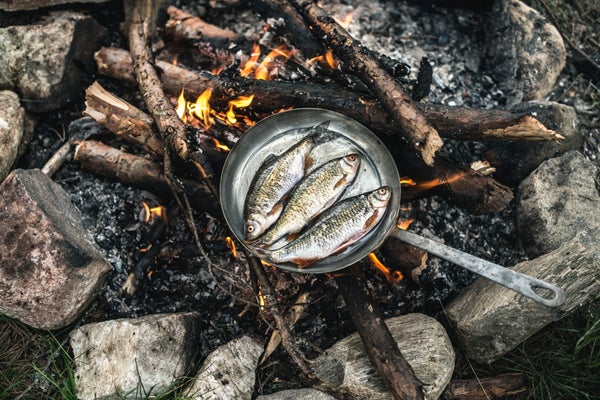The shift to a cooked-food diet was a decisive point in human history. The main topic of debate is when, exactly, this change occurred.
All known human societies eat cooked foods, and biologists generally agree cooking could have had major effects on how the human body evolved. For example, cooked foods tend to be softer than raw ones, so humans can eat them with smaller teeth and weaker jaws. Cooking also increases the energy they can get from the food they eat. Starchy potatoes and other tubers, eaten by people across the world, are barely digestible when raw. Moreover, when humans try to eat more like chimpanzees and other primates, we cannot extract enough calories to live healthily. Up to 50 percent of women who exclusively eat raw foods develop amenorrhea, or lack of menstruation, a sign the body does not have enough energy to support a pregnancy—a big problem from an evolutionary perspective.
Such evidence suggests modern humans are biologically dependent on cooking. But at what point in our evolutionary history was this strange new practice adopted? Some researchers think cooking is a relatively recent innovation—at most 500,000 years old. Cooking requires control of fire, and there is not much archaeological evidence for hearths and purposefully built fires before this time.
On supporting science journalism
If you're enjoying this article, consider supporting our award-winning journalism by subscribing. By purchasing a subscription you are helping to ensure the future of impactful stories about the discoveries and ideas shaping our world today.
The archaeological record becomes increasingly fragile farther back in time, however, so others think fire may have been controlled much earlier. Anthropologist Richard Wrangham has proposed cooking arose before 1.8 million years ago, an invention of our evolutionary ancestors. If the custom emerged this early, it could explain a defining feature of our species: the increase in brain size that occurred around this time.
What is the connection between cooking and brains? Understanding how and why our brains got so big has been a major puzzle because such a brain is metabolically expensive. In fact, the brain needs more energy for its size than any other organ. Although it might seem being smarter is always better, having a big brain exerts a high toll. Ancestral humans may have compensated for this energy cost by cooking food.
Like all ideas about human evolution, the cooking hypothesis can only be tested indirectly—without a time machine we cannot know exactly what happened in our evolutionary history. But there are several converging pieces of evidence that support Wrangham’s cooking hypothesis.
Fossils show the teeth and digestive tract of Homo erectus decreased in size around the same time brain size increased. This evidence likely means our ancestors started eating softer, higher-quality foods (although not necessarily cooked). New archaeological research has also continued to push back the earliest known date for the control of fire. For example, traces of purposeful fire at Wonderwerk Cave in South Africa have been dated at more than a million years old. Recent studies further suggest humans have genetic adaptions for eating cooked foods—some of which are old, at least predating our split from Neandertals. Finally, some of my own work, with psychologist Felix Warneken, has shown chimpanzees possess many of the foundational cognitive capacities needed to start cooking—such as a preference for cooked food, patience to wait for foods to be cooked and the capacity to plan for and transport foods to a cooking site. These data mean ancestral humans likely shared the same abilities, and could have started cooking rapidly after gaining the ability to control fire.
These converging pieces of evidence point to an earlier date for the adoption of a cooked diet, in line with Wrangham’s proposed time line. But many exciting questions remain open. How much of these changes were due to eating cooked foods specifically, versus the increased use of other processing techniques such as pounding or cutting foods? Did the adoption of cooking—generally a communal process in humans—require changes in our social behavior, given that other apes rarely share food? Are there other ways to grow a big brain? Answering these questions will continue to shed new light on human health, human psychology and the origins of our species.
